

Bringing Colour to Lives. Will Carrigan's suicide sparks Where There's A Will campaign for mental health programs in schools. Updated Media player: "Space" to play, "M" to mute, "left" and "right" to seek.
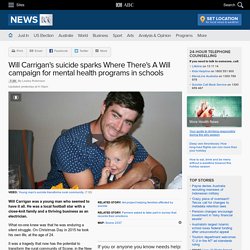
Video: Young man's suicide transforms rural community. (7.30) Will Carrigan was a young man who seemed to have it all. Mates Talk Change: Logan school initiative challenging rugby stereotypes for mental health. Updated The elite rugby league squad of a high school south of Brisbane is working to break the strong, silent stigma of their sport in a bid to improve youth mental health.
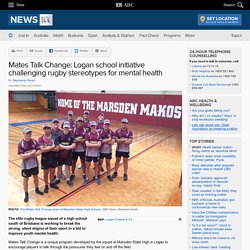
Mates Talk Change is a unique program developed by the squad at Marsden State High in Logan to encourage players to talk through the pressures they feel on and off the field. Seventeen-year-old Brayden Bochow said it was designed to break down stereotypes and encourage communication. Number of children seeking help for mental health problems doubles since 1998, landmark survey shows. Updated Many parents do not recognise when their child is suffering from depression, with the number of children seeking help for mental health problems doubling since 1998, according to a new report.
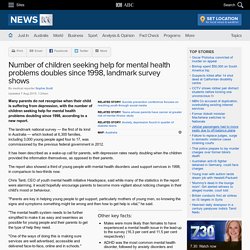
The landmark national survey — the first of its kind in Australia — which looked at 6,300 families, including 3,000 young people aged four to 17, was commissioned by the previous federal government in 2012. It has been described as a wake-up call for parents, with depression rates nearly doubling when the children provided the information themselves, as opposed to their parents. Teaching Peace in Elementary School. Photo FOR years, there has been a steady stream of headlines about the soaring mental health needs of college students and their struggles with anxiety and lack of resilience.
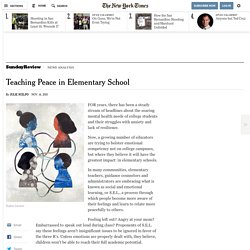
Now, a growing number of educators are trying to bolster emotional competency not on college campuses, but where they believe it will have the greatest impact: in elementary schools. In many communities, elementary teachers, guidance counselors and administrators are embracing what is known as social and emotional learning, or S.E.L., a process through which people become more aware of their feelings and learn to relate more peacefully to others. Feeling left out? Angry at your mom? APAPDC. 6.29 billion reasons youth mental health needs help - About ReachOut Australia. UPDATE: A Way Forward was released on Thursday, 7 May.
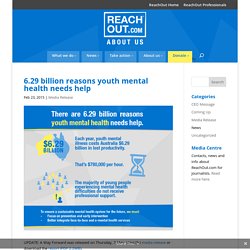
View the media release or download the report (PDF 2.2MB). Lost productivity amongst people with mental illness aged 12–25 costs Australia $6.29 billion per year, according to new data from ReachOut Australia and Ernst and Young (EY). New videos for children of parents with a mental health condition. Courtesy: COPMI Up to 23 per cent of Australian children have a parent who has a mental health condition.
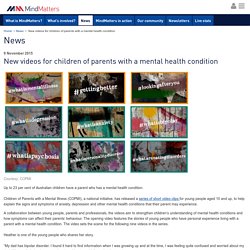
Schools reap rewards from focus on mental health. Nine Australian schools have been recognised for their focus on student wellbeing at an awards ceremony held in late 2013.
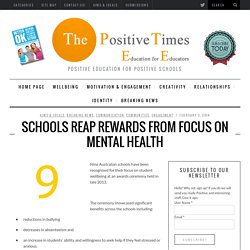
The ceremony showcased significant benefits across the schools including: Resilience classes aim to improve mental health of a generation. Resilience classes are being taught all over the world to help young people's long-term mental health.
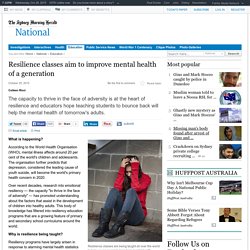
What is happening? According to the World Health Organisation (WHO), mental illness affects around 20 per cent of the world's children and adolescents. The organisation further predicts that depression, considered the leading cause of youth suicide, will become the world's primary health concern in 2020. Over recent decades, research into emotional resiliency — the capacity "to thrive in the face of adversity" — has promoted understanding about the factors that assist in the development of children into healthy adults. No CookiesHerald Sun. No Cookies. To use this website, cookies must be enabled in your browser. To enable cookies, follow the instructions for your browser below. Facebook App: Open links in External Browser There is a specific issue with the Facebook in-app browser intermittently making requests to websites without cookies that had previously been set.
This appears to be a defect in the browser which should be addressed soon. The simplest approach to avoid this problem is to continue to use the Facebook app but not use the in-app browser. Open the settings menu by clicking the hamburger menu in the top right Choose “App Settings” from the menu Turn on the option “Links Open Externally” (This will use the device’s default browser) Enabling Cookies in Internet Explorer 7, 8 & 9 Open the Internet Browser Click Tools> Internet Options>Privacy>Advanced Check Override automatic cookie handling For First-party Cookies and Third-party Cookies click Accept Click OK and OK Enabling Cookies in Firefox Enabling Cookies in Google Chrome. Counselling Services and MindMatters. MindMatters is a resource/framework that supports Australian secondary schools in promoting the social and emotional wellbeing of all members of the school community.

To find more about the MindMatters program at St Pius X College read the Parent Information Booklet. MindMatters & Kids Matter - Cedars Christian College. Cedars is a MindMatters accredited school and has received recognition for its success in promoting the social, emotional and mental wellbeing of staff and students.

Cedars has also partnered with Kids Matter Early Childhood, and Kids Matter Primary, as one of the first schools in Australia to implement these two new programs. C1 Full Web. MindMatters in action. Australian students lack skills to cope with life's problems, mental health study suggests. Updated More than half of Australian students lack the skills to deal with life's difficulties, a survey has found, with many citing depression, stress and a lack of confidence.
The study of more than 1,600 students in years 4 through to 12 by Resilient Youth Australia, a not-for-profit organisation promoting the mental health of young people, found a third of girls felt unhappy, depressed and lacking in confidence. One in three boys reported that they were constantly under strain, while a quarter had issues with confidence. "It's certainly a concern," said Andrew Fuller, a clinical psychologist and the director of Resilient Youth Australia. "It's something we need think about a national campaign of raising the overall level of resilience. " A quarter of those surveyed said they did not feel they would be able to fend off unwanted sexual advances. Alarmingly, almost half reported being bullied at school - twice the number being taunted online. "We engage with them well. Teenage depression and suicide rates make mental health an education issue.
Long journey: adolescence is a time when mental illness often emerges and schools are being urged to do more to help students. Photo: Joe Armao What is happening? In the World Health Organisation report, Health for the World's Adolescents (2014), depression is highlighted as the main cause of illness and disability for adolescents aged 10 to 19, and suicide; and the chief cause of death after traffic injuries and HIV/AIDS.
Research shows that foundations laid during adolescence have profound impacts on a nation's social fabric and economic productivity. The report draws on published evidence and direct consultations from around the world. Why was the WHO report necessary? The BRAVE Program. Youth, schools and suicide: tackling the youth suicide industry. By Michael Carr-Gregg MAPS. Suicide is the second most common cause of death among young men in the Western world. The emotional impact of suicide, especially of young people, has a devastating effect on any school community and often results in a frenzied call for action. Such a response has often produced what psychiatrist Stephen Rosenman calls a "do something, do anything" flurry of activity.
While this is understandable, Rosenman and others argue that much of this activity often represents an inappropriate knee jerk reaction, is ineffective and sometimes makes things even worse. A recent discussion paper by the Australian Psychological Society acknowledged that despite the fact that statistically suicide (and particularly youth suicide) was a rare event, psychologically it is far from rare.
The Australian Education Times April 2015 by The Australian Education Times.